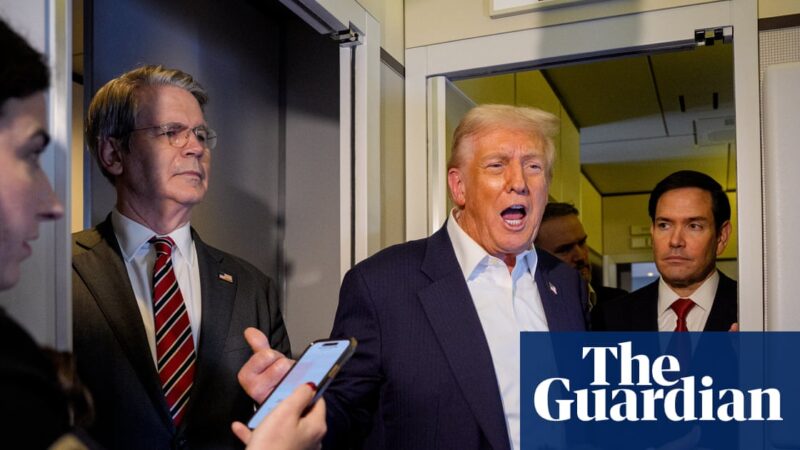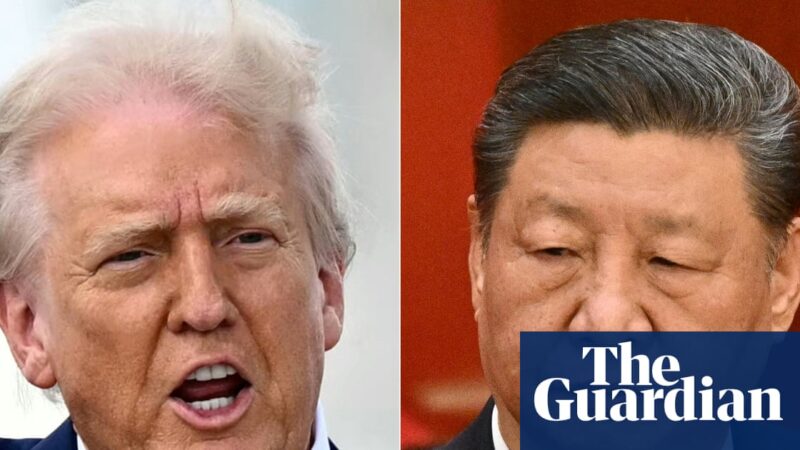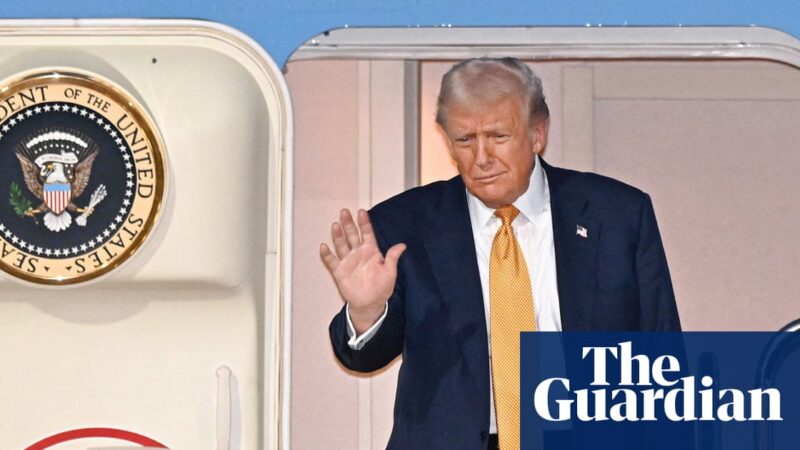Every American should read this judge’s stirring rebuke against Trump | Austin Sarat
Democracy requires that we do more than look out for our own interests and defend our own rights. Ever since the birth of this nation, its citizens and leaders have echoed Benjamin Franklin’s admonition that “we must all hang together, or, most assuredly, we shall all hang separately.”
In Donald Trump’s America, hanging separately seems to be the order of the day. This seems especially true when it comes to his treatment of this country’s millions of non-citizen residents.
From the start of his political career, demonizing immigrants has been Trump’s stock in trade. Since his return to office, he has been unusually aggressive in his campaign to round up, detain and deport people whose citizenship status is questionable, and, in some cases, citizens have been caught up in the dragnet.
The administration has repeatedly violated the constitution by targeting people because of how they look or the sound of their accents. It has even singled them out because of what they have said or written.
On 30 September, Judge William Young of the United States district court of Massachusetts made clear that when it comes to freedom of speech, the constitution does not distinguish between people born in the United States and those who have come here as immigrants. His decision in American Association of University Professors v Rubio offers both a stirring civics lesson and an unusually personal rebuke against the Trump administration. The court found that the Trump administration had violated the right to free speech in its push to detain and deport pro-Palestinian foreign scholars.
In his opinion, the judge went beyond the usual bounds of a judicial decision to note that the president “ignores everything … The Constitution, our civil laws, regulations, mores, customs, practices, courtesies – all of it; the President simply ignores it all when he takes it into his head to act”. Young added: “While the President naturally seeks warm cheering and gladsome, welcoming acceptance of his views, in the real world he’ll settle for sullen silence and obedience. What he will not countenance is dissent or disagreement.”
The judge also accused the president of “bullying”.
Legal purists who might applaud the judge’s reading of the constitution will be offended by seeing that kind of language in a judicial opinion. But what he did helps frame the danger Trump poses to the rights of immigrants in a way that connects them to the rest of us.
Bravo, Judge Young.
Recall the case of Mahmoud Khalil, a green card holder and graduate of Columbia University. He was arrested and detained in March for participating in pro-Palestinian protests on the Columbia University campus. He was held for more than a hundred days in Louisiana.
As his lawyer said on Democracy Now: “If free speech means anything in this country,” he noted, it means “government agents can’t pick you up off the street and throw you into jail because of what you’ve said.” But that is exactly what the administration did, hoping to make an example out of Khalil and send a chilling message to other immigrants.
Or how about Rümeysa Öztürk, a Tufts University graduate student, arrested by masked Ice agents for writing an op-ed calling on Tufts to do something to protect human rights in Gaza? As a Washington Post story notes, “Ozturk had committed no crime, yet her detention was a priority for the new Trump administration. US officials used the immigration system in unprecedented ways to covertly research and detain noncitizen students, relying on an investigative arm of the Department of Homeland Security whose work traditionally has focused on crimes such as drug smuggling and human trafficking.”
“The effort to deport pro-Palestinian student activists,” the Post reports, “represented the Trump administration’s first major challenge to free-speech norms in the United States.” It had to know that what it was doing violated the First Amendment but went ahead anyway under the pretext that it was acting to prevent or punish terrorist activities.
This is not the first time that immigrants have been punished for saying or doing things that an administration labelled dangerous. But since the middle of the 20th century, the supreme court has held that the government cannot deport people because of their views or what they say.
At that time, Justice William Douglas explained that “freedom of speech and of the press is accorded aliens residing in this country” and that “the utterances made by … [them] were entitled to that protection”. Justice Frank Murphy joined him and stated: “Once an alien lawfully enters and resides in this country he becomes invested with the rights guaranteed by the Constitution to all people within our borders.”
Young cited those views in his own opinion. “Noncitizens’ speech rights are,” he said, “identical to those of citizens.” He argued: “Political speech is not, on its own, a facially legitimate reason for expelling persons from this country.”
After laying out in great detail all the things the Trump administration has done to violate that principle, including its mistreatment of Khalil and Öztürk, he called out Trump for ignoring the constitution and acting as if “the First Amendment’s protection of freedom of speech applies to American citizens alone”.
Young called the case he was deciding “perhaps the most important ever to fall within the jurisdiction of this district court”.
Citing the language of the first amendment – “Congress shall make no law … abridging the freedom of speech” – the judge insisted: “‘No law’ means ‘no law.’ The First Amendment does not draw President Trump’s invidious distinction” between citizens and non-citizens, “and it is not to be found in our history”, Young wrote.
That reference to “our history” suggests that Trump’s treatment of non-citizens is un-American. But Young was not finished.
He added: “Triumphalism is the very essence of the Trump brand. Often this is naught but hollow bragging: ‘my perfect administration,’ wearing a red baseball cap in the presidential oval office emblazoned ‘Trump Was Right About Everything,’ or most recently depicting himself as an officer in the First Cavalry Division.”
He criticized Trump for his “triumphal, transactional, imperative, bellicose, and coarse” language that “seeks to persuade – not through marshaling data driven evidence, science, or moral suasion, but through power”.
Near the end of his opinion, Young quotes former president Ronald Reagan. “Freedom,” Reagan said, “is a fragile thing and it’s never more than one generation away from extinction. It is not ours by way of inheritance; it must be fought for and defended constantly by each generation, for it comes only once to a people …”
Returning to Trump, the judge goes on to say: “I’ve come to believe that President Trump truly understands and appreciates the full import of President Reagan’s inspiring message – yet I fear he has drawn from it a darker, more cynical message … [and that he] believes the American people are so divided that today they will not stand up, fight for, and defend our most precious constitutional values so long as they are lulled into thinking their own personal interests are not affected.”
By going beyond the precise issue in this case, the free speech rights of immigrants, and going after Trump, Young’s opinion helps frame threats to the rights of immigrants in a way that connects them to the rest of us. He hopes to rekindle the spirit of Reagan and inspire Americans to prove Trump wrong by showing that they will “stand up, fight for, and defend our most precious constitutional values”.
-
Austin Sarat, William Nelson Cromwell professor of jurisprudence and political science at Amherst College, is the author or editor of more than 100 books, including Gruesome Spectacles: Botched Executions and America’s Death Penalty





